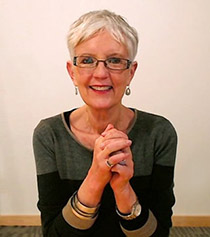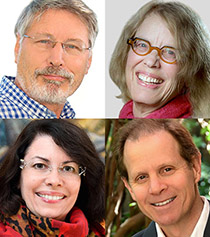The Neurobiology of Trauma – What’s Going On In the Brain When Someone Experiences Trauma?
 |
with Bessel van der Kolk, MD;
|
 |
with Bessel van der Kolk, MD; Pat Ogden, PhD; Ruth Lanius, MD; PhD Dan Siegel, MD; and Ruth Buczynski, PhD
Sign up for a Gold Membership

I signed up for the trauma series with the understanding that the series was available at anytime on video . Clearly I made a mistake as I was in Paris at the time, and working in London. I didnt return to the USA until end of November and now just ready to take the course. Now I see it has expired so essentially I wasted quite a bit of money plus the CEUs. Any suggestions.
This was a wonderful training! Follow up question for anyone on use of mindfulness with clients who have a trauma history. I have had several clients who are resistant to the use of mindfulness, many have resistance, because of previous therapists misuse. I usually explore their resistance with them and outline (if they did use it) what they would want to benefit from it. I am curious about the following:
How do you approach mindfulness with resistant clients?
When a client is resistant, do you approach mindfulness during a later phase of treatment?
What techniques are helpful to teaching mindfulness?
Any helpful resources you would recommend?
Thank you so much!
i feel you really went for the core of trauma tonight, thank you so much for these webinar sessions
enlarged amydala (mothers’ high cortisol levels while pregnant) – intriguing, i will research more online
Thank you Ruth! This was a wonderful way to start the series. It validates the tools I am teaching in my Breathwork and Gentle stretching techniques class for clients with sexual trauma here in Portland, Or. Many of our schools are replacing PTSD with PTSI- Post Traumatic Stress Injury. It does feel like a compassionate way that encourages healing.
Thank you! This updated information on neurobiology is exciting and so well explained! Ruth, your process of pausing to explain the points each expert has made is masterful.
Resourced with this material, we can explain to clients what happens to the brain during trauma and help them shed their personal shame about how trauma has affected them. Knowing that the integration of their traumatic experience is possible with mindfulness of the body and emotions is a powerful inspiration for healing.
As I start up a new practice having recently acquired an LCSW, I hope to integrate training as a massage therapist with clinical therapy. I am especially interested in sensorimotor psychotherapy as a way to integrate the learnings from this training session to inform my practice and process my own life experiences.
I learned about the vertical and left-right brain integration and the use of Mindfulness and body sensations as a way to help clients integrating the brain. Yet, I do not feel comfortable to say that I will start using the learnings. I feel that I need to get more confident in applying the brain integration interventions. I already use mindfulness and meditation with the majority of my clients.
Wonnderful opening for the series. Excellent summary of the brain functioning in the face of trauma. Looking forward to the more in depth discussion of mindfulness in trauma treatment. Thank you.
There is a confusion in the literature that I hope someone will take up and resolve for everyone who is looking for a definitive position on the Freeze response. Some refer to Freeze as the orienting moment that takes place at the beginning of the potential trauma. Others, like Ruth Lanius in the presentation, use Freeze to describe what the first group considers Tonic Catatonia and Tonic Collapse. While both ends of the trauma experience are similar in autonomic function and balance, they are also very different. Well-respected researchers are publishing on both sides. I would like someone to end the confusion by making a decision and sticking with it. Or, maybe that’s too much to hope for. Thoughts?
In the 20% that get PTSD and might some of them have temperaments consistent with the Highly Sensitive Persons (per Elaine Aron)?
Thanks for this wonderful consciousness-raising series. As Ron suggests, the contribution of neuroscience is a paradigm shift out of the 20C neurosis of self-blame and analysis – those stubborn discourses of guilt and talk therapy that go around in circles and waste time, years, whole lifetimes, keeping people trapped in mistaken and impotent meanings. I appreciate the hope that comes from understanding how mindfulness of body states, emotions and thoughts promotes integration – healing the fragmentation of dissociation. ‘Trauma’ is a wide word these days – a bit like ‘sustainability’: buzz words that point to themes that demand integration at the social level if humanity is to face current challenges. I quit my job as a boring counsellor applying organisationally-produced bandaids – in order to develop deeper healing work that is informed by this work and expressive arts therapy. Getting started and so the series is a very timely and accessible summary of this knowledge – and deeply supportive of therapeutic practice – and I will purchase the Gold Pass. The format works well, bringing faces and personalities to these Names – easy to remember. I appreciate your commitment to spreading this knowledge – fundamental to us all, how we understand ourselves, others and our societies. Thank you.
I heard a lot of information that is important in my work, and in my own life. Mindfulness Training is truely an important thing to learn. I have been to training and it affects me every day. It was particularly interesting to hear that it gives charge to your epigenetics and can in fact change your outcomes in life. I will be on next webinar for sure.
I’ve just watched again! Thank you for providing this opportunity! Yesterday after watching and commenting on the powerful experience, I realized how for years it was obvious to me that the people I was meeting in and out of therapy, in and out of recovery from adult children of alcoholics/addicts/dysfunctional families, as well as substance and process addiction recovery seemed to be more likely to have and possibly die from what I sensed were stress- and/or trauma-related illness such as cancer, diabetes, depression, heart disease, etc. Very powerful for me to see that my intuition/observations were on target; that the full extent of the impact of what I and so many of us were and are experiencing is truly expressed in our bodies, life experiences, diseases and health, as well as potential impacts on genes and future generations. It has felt like a long, short journey with so much further to go in the advances (many of us traveling the road to healing have seriously questioned if we have been helped by all the years of work we have invested, along with our lives and financial situation, in our healing), yet the current findings feel very promising to me! Thank you!
Thank you for bringing such great experts together to speak coherently about trauma and its possible effects on the brain! All of what was said reinforces my belief that EMDR Therapy, coupled with parts work and some somatic therapies, is uniquely positioned to change people’s lives!
I was very touched by Ruth’s reference to relatives of those suffering from trauma when she introduced this series. I know that experience first hand, being the partner of someone with Childhood PTSD, who had no real support from original caregivers.His father before him experienced the same… then obviously passed it on to him via beatings as a young child. Consequently we can’t have a fulfilled relationship. I’m a Life Coach seeking further understanding for myself and others, and have followed NICABM series before now. My partner, now over 70 has sought many groups and mindfullness techniques but not therapy. I personally feel it may be his only hope, and for our relationship also. Any advice for close relatives of those suffering from PTSD? I support him all I can, but am often met with denial, defence, and what feels like ‘stonewalling’. Almost impossible to live with, so I remove myself from our relatiuonship for much of the year.
I have empathy for your situation and as you ask for “advice,” I offer this. Self-compassion and more self-compassion, reaching out to others as you have done here, and providing your own self-soothing and self-care, even it means removing yourself from your relationship for much of the year. For self-soothing, I have made free video-tools of 3-6 minutes each, using brain-based, mind-body techniques that you can access here: http://www.layaseghi.com/video-tools
Since your partner has sought groups and mindfulness techniques but not therapy, shame may be involved.
Go to”www.pesi.com/brown-shame” and listen to Brene Brown’s wonderful presentation on how to recognize toxic shame and help oneself and others handle it in a healthy, healing way. The offer expires Oct 15. (Also offers one C.E.U.)
When Dan Seigel said that Presence will repair our telomeres, by optimizing telomaraze, he was surely also talking about Mindfullness that nurtures one’s Presence. Mindfullness and Presence are not exclusive, or separate ‘solutions’, in my view.
Research has been conducted on meditators that meditated on Loving Kindness and repaired their telomeres. This is a practice of Mindfullness. The results excite an inspire me with hope!
My perspective is also that we could try to ‘take in’ telomaraze as a medicine I think I’ver seen it in online marketplaces). Hiowever our body’s cells will not accept it if our cells’ receptors are addicted to other chemicals, for example being addicted to our body’s own cortisol over long periods of recalling stress events. I’d love to know others’ views on this. I look forward to the rest of these sessions. Many thanks for this informative series!
Apologies for my typos!
Helpful in explaining to clients how the body responds to trauma and how mindfulness, strategies, and tools can help with coping now, but also regarding coping in the future and genetics in the future. Loved the analogy re the tips of the shoelaces to protect the tellemeres (spelling?) and the brain and body’s vertical and horizontal integration system. Thank you!!!
Thanks for a fascinating introduction to What happens in the brain during trauma. I have a long held interest in neuroscience and have actually used mindfulness to alter menopausal symptoms by imagining myself in a bath of freezing cold water just as a hot flush occurred. I was able to completely stop these hot flushes within five weeks and have not had any more for eight years. Of course being a long time meditator and user of mindfulness for 20 years helped me to concentrate and change my physiology. I have taught these techniques to clients and the most useful aspect is having them understand the science behind the techniques.
Thank you so much for providing this for free! I have started a private practice in a new city and it’s been slower than expected to fill my schedule. Viewing these has kept me inspired and motivated to keep going!
Thank you for this webinar. So helpful in organising interventions and reflecting on specific ways of working as Dance Movement Psychotherapist in particular.
Exciting, information that helps integrate theory and practice. Thank you!
Hi, thanks for the great information! I’m a PhD student in anthropology (with a focus on neuroanthropology) investigating the sensory lifeworlds of people living with fibromyalgia, and how they navigate the world with sensory sensitivity. Most of my research participants have had some kind of trauma or significant stress, either early in life, or around the onset of their fibromyalgia symptoms, or both. I have the condition myself, and clinically I would fall into the complex PTSD category, so this information is personally relevant as well. This session is relevant in that it integrates with the kinds of sensory and visceral experiences reported by participants. I’ve been looking a lot at autonomic dysregulation, and also at the broader issue of how autonomic stress is often kind of culturally invisible, so people with the kinds of symptoms that emerge from this dysregulation have trouble making sense of it themselves, but also have difficulty getting it recognised medically. The idea about the mind not just being the brain but the whole body and relational world is central to the neuroanthropology approach I am taking, looking at the relationship between culture and the brain. I’ve been looking at epigenetics as well, so fantastic to know we can change our telomeres!
Thank you for the wonderful opportunity to hear from the worlds top experts. I am not in practice at the moment due to ill health but it is truly wonderful to be able to keep in touch . I find your commentary very helpful and it allows me to keep focused on all the insights . Thank you too for the opportunity to have a second chance to hear the sessions as just now finances don’t allow me to purchase the package.
Thank you Thank you
Finola Finn
When I have my degree I’ll use this to help victims of domestic violence. I’m a survivor of DV and someone whose experienced trauma from being unable to get away from the violence before I ended up experiencing disassociation and being diagnosed with CPTSD. I’ve experienced fight, flight and freeze. Its wonderful to be on the other side of all this. I probably wouldnt be except I had a secure, nuturing and and loving family when I was growing up! Learning some of the details regarding DNA is very exciting to me!